Wikipedia:Picture of the day/January 2008
January 1[àtúnṣe àmìọ̀rọ̀]
| Àwòrán Ọjọ́ Òní | |
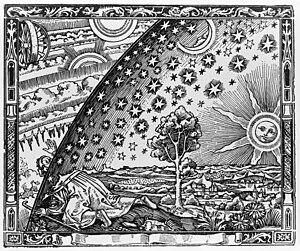
|
The Flammarion woodcut is an enigmatic wood engraving by an unknown artist that first appeared in Camille Flammarion's L'atmosphère: météorologie populaire (1888), a work on meteorology for a general audience. The image depicts a man peering through the Earth's atmosphere as if it were a curtain to look at the inner workings of the universe. The caption translates to "A medieval missionary tells that he has found the point where heaven and Earth meet..." Image credit: Unknown |
January 2[àtúnṣe àmìọ̀rọ̀]
| Àwòrán Ọjọ́ Òní | |

|
The vigorous young growth of the Tempranillo grape vine vitis vinifera in a typical vineyard in the Catalan Penedès region. One of the most ancient wine regions in Europe, el Penedès is home to some of the most innovative of the so-called Old World growers. Photo credit: Mick Stephenson |
January 3[àtúnṣe àmìọ̀rọ̀]
| Àwòrán Ọjọ́ Òní | |

|
Alexander Litovchenko's 1875 painting depicting Ivan IV of Russia seated in the Kremlin Armoury, his half-witted heir Fyodor standing behind, a group of distrustful boyars whispering at a distance, and the Tsar's jester in a skomorokh cap addressing the English diplomat Jerome Horsey. Horsey was a resident of the Russia Company in Moscow from 1572 to 1585. Artist: Alexander Litovchenko |
January 4[àtúnṣe àmìọ̀rọ̀]
| Àwòrán Ọjọ́ Òní | |

|
Alexander Litovchenko's 1875 painting depicting Ivan IV of Russia seated in the Kremlin Armoury, his half-witted heir Fyodor standing behind, a group of distrustful boyars whispering at a distance, and the Tsar's jester in a skomorokh cap addressing the English diplomat Jerome Horsey. Horsey was a resident of the Russia Company in Moscow from 1572 to 1585. Artist: Alexander Litovchenko |
January 5[àtúnṣe àmìọ̀rọ̀]
| Àwòrán Ọjọ́ Òní | |
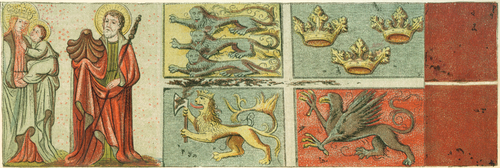
|
|
|
A medieval ship flag captured by forces from Lübeck in the 1420s showed the arms of Denmark, Sweden, Norway and Pomerania. At the time, Denmark, Norway and Sweden were united in the Kalmar Union. The flag is believed to originate from the reign of king Eric of Pomerania due to its inclusion of Pomerania's griffin symbol. For the following five hundred years, the flag was displayed as a war trophy in a Lübeck church until destroyed during a World War II air raid on the city. An 1880s copy of the flag is preserved in the museum at Frederiksborg Palace, Denmark. The saint accompanying the Virgin Mary and infant Christ is Saint James the Greater, identified by his scallop shell emblem. The flag was made of coarse linen. All figures and heraldic insignia were created using oil-based paint. Image credit: Julius Magnus Petersen | |
January 6[àtúnṣe àmìọ̀rọ̀]
| Àwòrán Ọjọ́ Òní | |

|
Image credit: Unknown |
January 7[àtúnṣe àmìọ̀rọ̀]
| Àwòrán Ọjọ́ Òní | |

|
"Discussing the War in a Paris Café" from the Illustrated London News of 17 September 1870: A scene from the Franco-Prussian War. The Napoleonic empire had ended a few days before this when Napoleon III was captured in the Battle of Sedan and deposed by the French government soon thereafter. However, the proposed German peace treaty was rejected, and two days after this image was published, Paris came under siege. Image credit: Frederick Barnard |
January 8[àtúnṣe àmìọ̀rọ̀]
| Àwòrán Ọjọ́ Òní | |

|
The yellow-tipped EIAJ connector is a small (~2 cm) standard DC power supply jack for small appliances, commonly used to adapt transformers converting mains power for laptop computers and peripheral devices. The connectors are supplied in a range of sizes according to power rating of the device; bigger plugs are used for higher voltages, to reduce the risk of using too high a power rating and damaging the appliance. Photo credit: Mick Stephenson |
January 9[àtúnṣe àmìọ̀rọ̀]
| Àwòrán Ọjọ́ Òní | |

|
The White-crowned Sparrow (Zonotrichia leucophrys) is a medium-sized sparrow native to North America. Their breeding habitat is brushy areas across northern Canada and the western United States. Its call has many dialects, but one subspecies sounds similar to "You can't come and catch me!" Photo credit: Wolfgang Wander |
January 10[àtúnṣe àmìọ̀rọ̀]
| Àwòrán Ọjọ́ Òní | |

|
The remains of the SS American Star, an ocean liner originally built for the United States Lines, ten years after its 1994 shipwreck off Fuerteventura in the Canary Islands. The stern broke off and sank, leaving only the bow section on the sandbar. Since this photo was taken, the ship has listed to port and become almost completely submerged. Photo credit: Wollex |
January 11[àtúnṣe àmìọ̀rọ̀]
| Àwòrán Ọjọ́ Òní | |
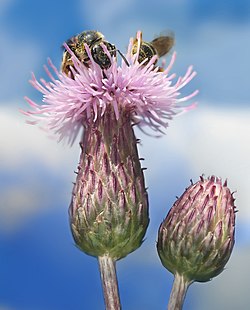
|
Two honeybees collect nectar from Cirsium arvense (commonly known as Creeping Thistle) flowers. Although this plant is considered as a weed and invasive species, it provides food for the Goldfinch and Linnet, as well as over 20 species of Lepidoptera, including the Painted Lady butterfly, and the Engrailed, a species of moth, and several species of aphids. It is also edible by humans, but rarely used due to its propensity to induce flatulence in some people. Photo credit: Richard Bartz |
January 12[àtúnṣe àmìọ̀rọ̀]
| Àwòrán Ọjọ́ Òní | |

|
Full moon is a lunar phase that occurs when the moon is on the opposite side of the earth from the sun, and when the three celestial bodies are aligned as closely as possible to a straight line. At this time, as seen by viewers on earth, the hemisphere of the moon that is facing the earth (the near side) is fully illuminated by the sun and appears round. Only during a full moon is the opposite hemisphere of the moon, which is not visible from earth (the far side), completely unilluminated. Photo credit: Luc Viatour |
January 13[àtúnṣe àmìọ̀rọ̀]
| Àwòrán Ọjọ́ Òní | |

|
Two drone flies (Eristalis tenax) mating on a flower. The larva is a rat-tailed maggot, which lives in drainage ditches, pools around manure piles, sewage, and similar places containing water badly polluted with organic matter, but adult flies have never been implicated as disease vectors. Photo credit: Fir0002 |
January 14[àtúnṣe àmìọ̀rọ̀]
| Àwòrán Ọjọ́ Òní | |

|
A scanning electron microscope image of a single neutrophil granulocyte (large yellow cell), engulfing anthrax bacteria (orange rod-shaped structures). Scale bar is 5 micrometers. Generally referred to as neutrophils, they are the most abundant type of white blood cells in humans and form an integral part of the immune system. These phagocytes are normally found in the blood stream. However, during the acute phase of inflammation, particularly as a result of bacterial infection, neutrophils leave the vasculature and migrate toward the site of inflammation in a process called chemotaxis. Image credit: Volker Brinkmann, PLoS |
January 15[àtúnṣe àmìọ̀rọ̀]
| Àwòrán Ọjọ́ Òní | |

|
|
|
Panoramic view from the Symbolic Mountain at the Japanese garden in Cowra, New South Wales, Australia. One of the principles in designing Japanese gardens is adapting common elements, such as stones and water, to the conditions of the land. The Cowra garden is a kaiyū-shiki or strolling garden. The view takes in the gardens and the plains of the Cowra Shire across to the nearby mountains. Photo credit: John O'Neill | |
January 16[àtúnṣe àmìọ̀rọ̀]
| Àwòrán Ọjọ́ Òní | |

|
The Eastern Screech Owl (Megascops asio) is a small owl native to eastern North America. Usually solitary, they nest in a tree cavity, either natural or excavated by a woodpecker; they will also use nesting boxes. They are strictly nocturnal, roosting during the day in cavities or next to tree trunks. They mainly eat large insects and small rodents, as well as small birds. They are active at night or near dusk, using their excellent hearing and night vision to locate prey. Photo credit: Wolfgang Wander |
January 17[àtúnṣe àmìọ̀rọ̀]
| Àwòrán Ọjọ́ Òní | |

|
Fuel dumping is a practice used by aircraft that are equipped to jettison fuel in the event of certain types of emergency situations. This RAAF F-111 aircraft is performing a dump-and-burn fuel dump at the Australian International Airshow, a procedure where the fuel is intentionally ignited using the plane's afterburner. This type of fuel dumping is also referred to as "torching" or a "zippo". Photo credit: John O'Neill |
January 18[àtúnṣe àmìọ̀rọ̀]
| Àwòrán Ọjọ́ Òní | |
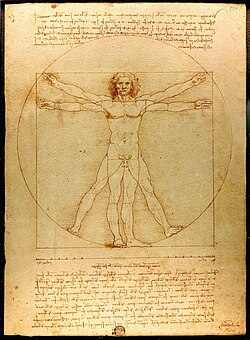
|
A photo of an original page from Leonardo da Vinci's journal, showing the world-renowned drawing known as the Vitruvian Man, created around the year 1492. The drawing and text are sometimes called the Canon of Proportions or, less often, Proportions of Man. Leonardo based his drawing on some hints at correlations of ideal human proportions with geometry in Book III of the treatise De Architectura by the ancient Roman architect Vitruvius, thus its name. The accompanying notes are written in mirror writing and describe the drawing as a study of the proportions of the (male) human body as described by Vitruvius. Photo credit: Luc Viatour |
January 19[àtúnṣe àmìọ̀rọ̀]
| Àwòrán Ọjọ́ Òní | |

|
The vibration of a beam, such as this cantilever made of borosilicate glass, can be described with the Euler-Bernoulli beam equation alongside a loading function which includes inertia, gravity, and possibly drag, and functions describing the variable section modulus and linear density. The traces of the exposure show decaying oscillations and motion that is not simple harmonic. Photo credit: Ben pcc |
January 20[àtúnṣe àmìọ̀rọ̀]
| Àwòrán Ọjọ́ Òní | |

|
A close-up of 10 km (6.2 mi) high mountains within the equatorial ridge on Saturn's moon Iapetus, photographed by the Cassini orbiter. Above the middle of the image can be seen a place where an impact has exposed the bright ice beneath the dark overlying material. The image was taken on September 10, 2007, with the Cassini spacecraft narrow-angle camera at a distance of approximately 3,870 km (2,400 mi) from Iapetus. Photo credit: Cassini orbiter |
January 21[àtúnṣe àmìọ̀rọ̀]
| Àwòrán Ọjọ́ Òní | |

|
An aerial photo of the World Trade Center complex, 12 days after its destruction on September 11, 2001. This image, as taken by a NOAA Cessna Citation from an altitude of 1 kilometre (0.6 mi), shows NYC firefighters and construction equipment surrounding the debris created by the attack. Also noticeable is how the shrapnel caused further structural damage on the surrounding buildings. Photo credit: NOAA |
January 22[àtúnṣe àmìọ̀rọ̀]
| Àwòrán Ọjọ́ Òní | |
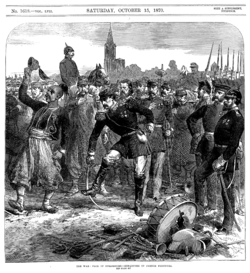
|
The [Franco-Prussian] War: Fall of Strasbourg - Departure of French Prisoners", from the 15 October 1870 issue of the Illustrated London News The Siege of Strasbourg was a rather one-sided battle, with the German assault only limited by the amount of ammunition they had, and fortresses falling regularly. Napoleon III's capture in the Battle of Sedan on 1 September, 1870 (and the fall of the Second French Empire) meant that no relief was coming, and, though the city held on a while after the news reached them, the relentless forward movement of the Prussian lines eventually forced surrender on the 27th of September. Image credit: William Simpson and Arthur Hopkins |
January 23[àtúnṣe àmìọ̀rọ̀]
| Àwòrán Ọjọ́ Òní | |

|
Wildfire on the island of Hawaiʻi caused by pāhoehoe lava flowing on the coastal plain of Kīlauea The new lava is moving across the old surface, which is covered with a roughly 1 in (2.54 cm) thick layer of moss. The burning moss generates the smoke visible in the image. This kind of fire cannot be easily prevented or suppressed. Photo credit: Mila Zinkova |
January 24[àtúnṣe àmìọ̀rọ̀]
| Àwòrán Ọjọ́ Òní | |

|
|
|
A 360° panorama of London taken from the dome of St Paul's Cathedral. Built from 1675 to 1708, the Cathedral is still one of the highest buildings in western London. Photo credit: David Iliff | |
January 25[àtúnṣe àmìọ̀rọ̀]
| Àwòrán Ọjọ́ Òní | |

|
Dr. Javier Solana, the High Representative for the Common Foreign and Security Policy and the Secretary-General of both the Council of the European Union (EU) and the Western European Union (WEU). This photograph shows him as he is discussing with students of RWTH Aachen University, one day before receiving the International Charlemagne Prize of the city of Aachen. Photo credit: א |
January 26[àtúnṣe àmìọ̀rọ̀]
| Àwòrán Ọjọ́ Òní | |

|
Off the coast of Juneau, Alaska, a group of 15 Humpback Whales works in tandem to catch herring using the bubble net fishing technique, in which they exhale through their blowholes, creating a ring of bubbles up to 30 m (100 ft) in diameter. The whales then suddenly swim upwards through the bubble net swallowing thousands of fish in each gulp. Photo credit: Georgia Evelyn Stants |
January 27[àtúnṣe àmìọ̀rọ̀]
| Àwòrán Ọjọ́ Òní | |

|
A motocross competitor riding a Yamaha four-stroke engine bike, doing a "mono" at the Phillip Island Grand Prix Circuit. Motocross is a form of motorcycle sport or all-terrain vehicle racing held on enclosed off road circuits. The name "motocross" is a contraction derived from the words "motorcycle" and "cross country". Photo credit: Fir0002 |
January 28[àtúnṣe àmìọ̀rọ̀]
| Àwòrán Ọjọ́ Òní | |

|
A Gold dust day gecko (Phelsuma laticauda laticauda) licking nectar from a bird of paradise flower in Kailua-Kona, Hawaii. Native to Madagascar and the Comoro Islands, this day gecko has been introduced to Farquhar Atoll in the southern Seychelles, and onto the Hawaiian Islands. Photo credit: Mila Zinkova |
January 29[àtúnṣe àmìọ̀rọ̀]
| Àwòrán Ọjọ́ Òní | |

|
A portrait of Lillian Gish from 1921. Gish was one of the first female movie stars, called "The First Lady of the Silent Screen", starting in 1912 and continuing to appear in films until 1987. The American Film Institute named Gish 17th among the greatest female stars of all time and awarded her a Life Achievement Award, making her the only recipient who was a major figure in the silent era. Remarkably, she never won an Academy Award for her work, although she did receive a Special Academy Award in 1971. Photo credit: Bain News Service |
January 30[àtúnṣe àmìọ̀rọ̀]
| Àwòrán Ọjọ́ Òní | |
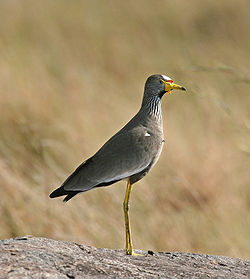
|
The Senegal Wattled Plover (Vanellus senegallus) is a large lapwing, a group of largish waders in the family Charadriidae. It is a resident breeder in most of Sub-Saharan Africa outside the rainforests, although it has seasonal movements. These are conspicuous and unmistakable birds. They are large brown waders with a black crown, white forehead and large yellow facial wattles. The tail is white, tipped black and the long legs are yellow. Photo credit: Whit Welles |
January 31[àtúnṣe àmìọ̀rọ̀]
| Àwòrán Ọjọ́ Òní | |

|
In mathematics, the Sieve of Eratosthenes is a simple, ancient algorithm for finding all prime numbers up to a specified integer. It is the predecessor to the modern Sieve of Atkin, which is faster but more complex. The eponymous Sieve of Eratosthenes was created in the 3rd century BC by Eratosthenes, an ancient Greek mathematician. Image credit: Sebastian Koppehel |
